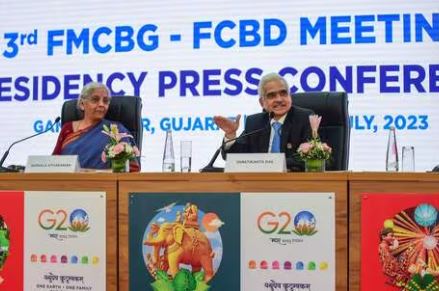
According to people familiar with the development, the majority of G20 members now concur with India’s central bank’s assessment that cryptocurrencies could pose significant risks to the stability of the financial system. These nations may work to institutionalise an internationally-accepted regulatory framework for crypto-assets while allowing individual jurisdictions to impose stricter regulations beyond that minimum threshold, or even a complete ban.
According to at least three people with direct knowledge of the situation who requested anonymity and shared insights from and details of discussions at the third meeting of the G20 Finance Ministers and Central Bank Governors (FMCBG) held last week in Gandhinagar, the initial enthusiasm shown by some countries with regard to cryptocurrencies has now diminished as most of them have realised the macroeconomic risks and other challenges associated with them.
One of them added, “Many countries are also concerned about the risks of cryptos being used for drug trafficking, funding terrorism, and money laundering and the recent collapse of crypto exchanges.” Over 1 million investors were impacted by the collapse of FTX, the second-largest cryptocurrency exchange in the world, in November 2022.
Before the G20 will eventually take the issue under consideration, specialists will properly assess the financial and macroeconomic dangers associated with cryptocurrencies and provide ideas on how to manage them, according to a second individual. The International Monetary Fund (IMF) and the Financial Stability Board (FSB) are analysing crypto-related issues and will present a “synthesis paper” on this topic later this year, he added. The synthesis method will tackle two major topics: financial stability and crypto laws.
The first person claimed that there has been a noticeable change in numerous nations’ perspectives on cryptocurrency. Now, the majority of them share RBI’s (Reserve Bank of India) concerns about the financial and other hazards connected to cryptocurrencies. This topic was thoroughly discussed at the third G20 FMCBG conference, he claimed.
The issue was raised in the conclusion and chair summary of the third G20 FMCBG meeting on July 18: “We look forward to receiving the IMF-FSB Synthesis Paper, including a Roadmap, before the Leaders’ Summit in September 2023 to support a coordinated and thorough policy and regulatory framework taking into account the full range of risks, risks specific to the emerging market and developing economies (EMDEs), and ongoing global implementation of FATF standards.”
The two most recent reports on cryptocurrencies presented to the G20 FMCBG in its July meeting, one by the FSB and the other by the Bank for International Settlements (BIS), according to the individuals mentioned above, highlighted the necessity of developing a strong regulatory mechanism that would also address macroeconomic risks.
The first individual added that during the discussion, members supported the FSB’s high-level suggestions for the regulation, supervision, and oversight of crypto-assets operations. “It did not go into risks associated with crypto-assets,” he claimed. The recommendations “do not comprehensively cover all specific risk categories related to crypto-asset activities, such as: AML/CFT [anti money laundering/combating the financial terrorism]; data privacy; cyber security; consumer and investor protection; market integrity; competition policy; taxation; monetary policy; monetary sovereignty; and other macroeconomic concerns,” according to the FSB.
The BIS paper, “The Crypto Ecosystem: Key Elements and Risks,” which examines major aspects of the cryptocurrency ecosystem, evaluates its weaknesses structurally, and identifies threats it poses, was also welcomed by the G20 FMCBG. The paper draws the conclusion that “crypto has so far failed to harness innovation to the benefit of society” and “crypto’s inherent structural flaws make it unsuitable to play a significant role in the monetary system”.
Crypto does not finance actual economic activity and continues to be mostly self-referential. It has innate problems with responsibility, integrity, and stability as well as efficiency and effectiveness. Rather than being caused by technological limits, these structural problems are a result of the economics of incentives at play, according to the BIS analysis.
The Reserve Bank of India (RBI) has already expressed its worries about how cryptocurrencies will affect the Indian economy negatively, but the Union government believes that because cryptocurrencies are global in nature, any unilateral ban or regulation will be ineffective and that international cooperation is required to prevent regulatory arbitrage.

















